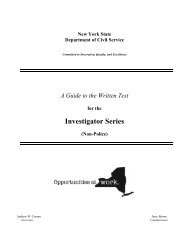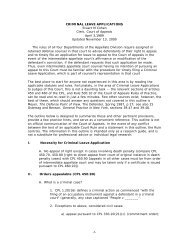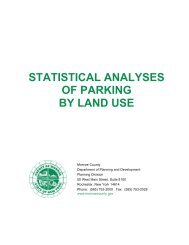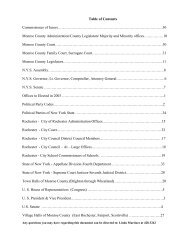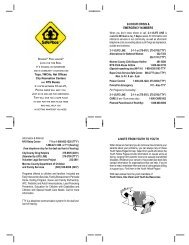evidentiary issues in family court child abuse and ... - Monroe County
evidentiary issues in family court child abuse and ... - Monroe County
evidentiary issues in family court child abuse and ... - Monroe County
Create successful ePaper yourself
Turn your PDF publications into a flip-book with our unique Google optimized e-Paper software.
5. Medical proof. See eg., Matter of Joli M., 131 Misc2d 1088 (New York <strong>County</strong>, FamilyCourt, 1986) [pregnancy provided corroboration of sexual <strong>abuse</strong>].6. Child's statements to different persons may not cross-corroborate each other, Matter ofFrances Charles W.,71 NY2d 112,123 (1988) but the consistency of statements made todifferent persons on different occasions may be considered. Matter of Starr H., 156 AD2d1025 (4 th Dept. 1989).C. Expert validation testimony <strong>in</strong> sexual <strong>abuse</strong> cases may provide corroboration. Matter of Nicole V.,71 NY2d 112 (1988).1. A validator is generally a mental health professional] who has expertise <strong>in</strong> sexual <strong>abuse</strong>of <strong>child</strong>ren <strong>and</strong> who testifies that a <strong>child</strong>'s behavior, statements <strong>and</strong> characteristics areconsistent with hav<strong>in</strong>g been sexually <strong>abuse</strong>d. Sometimes the validator will offer anop<strong>in</strong>ion on the identity of the perpetrator. See, Matter of Melissa M., 136 Misc2d 773(Family Ct.,Suffolk Co., 1987).2. Expert need not be psychologist or psychiatrist. McWhirter vs. McWhirter, 129 AD2d1007 (4 th Dept. 1987).3. Testimony concern<strong>in</strong>g the <strong>child</strong>'s overall credibility is generally objectionable. But see,Matter of Br<strong>and</strong>on U.U., 193 AD2d 835 (3 rd Dept. 1993).VII.VIII.CPLR privileges are all waived with the exception of Attorney/Client [CPLR §4503) <strong>and</strong>Clergy/Penitent CPLR §4505) privileges. FCA §1046(a) (vii).Proof of "impairment of emotional health" or "impairment of mental or emotional condition" as theresult of the unwill<strong>in</strong>gness/<strong>in</strong>ability of respondent to exercise a m<strong>in</strong>imum degree of care toward the<strong>child</strong> may <strong>in</strong>clude expert testimony or proof that the impairment lessened dur<strong>in</strong>g a period when the<strong>child</strong> was not <strong>in</strong> respondent's care. FCA §1046 (a) (viii).A. FCA § 1012(h) def<strong>in</strong>es impairment of emotion health <strong>and</strong> impairment of mental or emotionalcondition to <strong>in</strong>cluded such conditions as "failure to thrive"(when an <strong>in</strong>fant fails to ga<strong>in</strong> weight <strong>and</strong>develop normally despite the fact that there are no identified organic causes), self destructiveimpulses, habitual truancy <strong>and</strong> substantially dim<strong>in</strong>ished psychological function<strong>in</strong>g, as long as theimpairment is clearly attributable to the respondent's failures to exercise a m<strong>in</strong>imum degree of caretoward the <strong>child</strong>.B. Comes up often <strong>in</strong> failure to thrive cases, when the agency alleges that the <strong>in</strong>fant ga<strong>in</strong>ed weightwhile <strong>in</strong> the hospital or foster care home, but loses weight while <strong>in</strong> parent's care.IX.Proof of neglect/<strong>abuse</strong> must be based upon a preponderance of the competent, material <strong>and</strong> relevantevidence. FCA §1046 (b).A. The preponderance of the evidence st<strong>and</strong>ard of proof is constitutionally satisfactory. Matter ofTammie Z., 66 NY2d 1(1985).B. If the case proceeds to disposition, the evidence need only be relevant <strong>and</strong> material. FCA § 1046(c).Page 4 of 4



